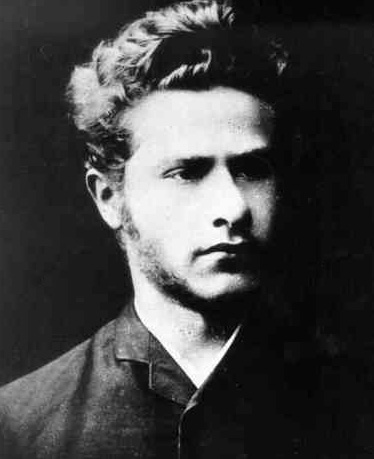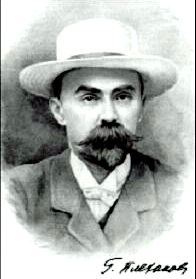|
Leo Jogiches
Leon "Leo" Jogiches (Russian: Лев "Лео" Йогихес; 17 July 1867 – 10 March 1919), also commonly known by the party name Jan Tyszka, was a Polish Marxist revolutionary and politician, active in Poland, Lithuania, and Germany. Jogiches was a founder of the political party known as the Social Democracy of the Kingdom of Poland and Lithuania (main forerunner of the Communist Party of Poland) in 1893 and a key figure in the underground Spartacus League in Germany, the predecessor of the Communist Party of Germany, during the years of World War I. For many years the personal companion and a close political ally of internationally famous revolutionary Rosa Luxemburg, Jogiches was assassinated in Berlin by right-wing paramilitary forces in March 1919 while investigating Luxemburg's murder some weeks before. Early life Leon Jogiches was born on 17 July 1867 to a wealthy ethnic History of the Jews in Poland, Polish-Jewish family in Vilnius, now Lithuania Lithuania (; ... [...More Info...] [...Related Items...] OR: [Wikipedia] [Google] [Baidu] |
Vilnius
Vilnius ( , ; see also other names) is the capital and largest city of Lithuania, with a population of 592,389 (according to the state register) or 625,107 (according to the municipality of Vilnius). The population of Vilnius's functional urban area, which stretches beyond the city limits, is estimated at 718,507 (as of 2020), while according to the Vilnius territorial health insurance fund, there were 753,875 permanent inhabitants as of November 2022 in Vilnius city and Vilnius district municipalities combined. Vilnius is situated in southeastern Lithuania and is the second-largest city in the Baltic states, but according to the Bank of Latvia is expected to become the largest before 2025. It is the seat of Lithuania's national government and the Vilnius District Municipality. Vilnius is known for the architecture in its Old Town, declared a UNESCO World Heritage Site in 1994. The city was noted for its multicultural population already in the time of the Polish–Lithuanian ... [...More Info...] [...Related Items...] OR: [Wikipedia] [Google] [Baidu] |
History Of The Jews In Poland
The history of the Jews in Poland dates back at least 1,000 years. For centuries, Poland was home to the largest and most significant Ashkenazi Jewish community in the world. Poland was a principal center of Jewish culture, because of the long period of statutory toleration, religious tolerance and Qahal, social autonomy which ended after the Partitions of Poland in the 18th century. During World War II there was a nearly complete genocide, genocidal destruction of the Polish Jewish community by Nazi Germany and its collaborators of various nationalities, during the German occupation of Poland between 1939 and 1945, called the Holocaust. Since the fall of communism in Poland, there has been a renewed interest in Jewish culture, featuring an annual Jewish Culture Festival, new study programs at Polish secondary schools and universities, and the opening of Warsaw's Museum of the History of Polish Jews. From the founding of the Kingdom of Poland (1025–1385), Kingdom of Poland i ... [...More Info...] [...Related Items...] OR: [Wikipedia] [Google] [Baidu] |
Georgy Plekhanov
Georgi Valentinovich Plekhanov (; rus, Гео́ргий Валенти́нович Плеха́нов, p=ɡʲɪˈorɡʲɪj vəlʲɪnˈtʲinəvʲɪtɕ plʲɪˈxanəf, a=Ru-Georgi Plekhanov-JermyRei.ogg; – 30 May 1918) was a Russian revolutionary, philosopher and Marxist theoretician. He was a founder of the social-democratic movement in Russia and was one of the first Russians to identify himself as "Marxist". Facing political persecution, Plekhanov emigrated to Switzerland in 1880, where he continued in his political activity attempting to overthrow the Tsarist regime in Russia. Plekhanov is known as the "father of Russian Marxism". Born to a Tatar noble family of serf-owning landlords and minor government officials, Plekhanov grew up to reject his social class. As a student he became a Marxist. Although he supported the Bolshevik faction at the 2nd Congress of the Russian Social Democratic Labour Party in 1903, Plekhanov soon rejected the idea of democratic centrali ... [...More Info...] [...Related Items...] OR: [Wikipedia] [Google] [Baidu] |
Tsarist Autocracy
Tsarist autocracy (russian: царское самодержавие, transcr. ''tsarskoye samoderzhaviye''), also called Tsarism, was a form of autocracy (later absolute monarchy) specific to the Grand Duchy of Moscow and its successor states the Tsardom of Russia and Russian Empire. In it, the Tsar possessed in principle authority and wealth, with more power than constitutional monarchs counterbalanced by a legislative authority, as well as more religious authority than Western monarchs. The institution originated during the time of Ivan III (1462−1505), and was abolished after the Russian Revolution of 1917. Alternative names Imperial autocracy, Russian autocracy, Muscovite autocracy, tsarist absolutism, imperial absolutism, Russian absolutism, Muscovite absolutism, Muscovite despotism, Russian despotism, tsarist despotism or imperial despotism. History Ivan III (reigned 1462-1505) built upon Byzantine traditions and laid foundations for the tsarist autocracy which with ... [...More Info...] [...Related Items...] OR: [Wikipedia] [Google] [Baidu] |
Switzerland
). Swiss law does not designate a ''capital'' as such, but the federal parliament and government are installed in Bern, while other federal institutions, such as the federal courts, are in other cities (Bellinzona, Lausanne, Luzern, Neuchâtel, St. Gallen a.o.). , coordinates = , largest_city = Zürich , official_languages = , englishmotto = "One for all, all for one" , religion_year = 2020 , religion_ref = , religion = , demonym = , german: Schweizer/Schweizerin, french: Suisse/Suissesse, it, svizzero/svizzera or , rm, Svizzer/Svizra , government_type = Federalism, Federal assembly-independent Directorial system, directorial republic with elements of a direct democracy , leader_title1 = Federal Council (Switzerland), Federal Council , leader_name1 = , leader_title2 = , leader_name2 = Walter Thurnherr , legislature = Fe ... [...More Info...] [...Related Items...] OR: [Wikipedia] [Google] [Baidu] |
Conscription
Conscription (also called the draft in the United States) is the state-mandated enlistment of people in a national service, mainly a military service. Conscription dates back to antiquity and it continues in some countries to the present day under various names. The modern system of near-universal national conscription for young men dates to the French Revolution in the 1790s, where it became the basis of a very large and powerful military. Most European nations later copied the system in peacetime, so that men at a certain age would serve 1–8 years on active duty and then transfer to the reserve force. Conscription is controversial for a range of reasons, including conscientious objection to military engagements on religious or philosophical grounds; political objection, for example to service for a disliked government or unpopular war; sexism, in that historically men have been subject to the draft in the most cases; and ideological objection, for example, to a perceived vio ... [...More Info...] [...Related Items...] OR: [Wikipedia] [Google] [Baidu] |
Georgi Plekhanov
Georgi Valentinovich Plekhanov (; rus, Гео́ргий Валенти́нович Плеха́нов, p=ɡʲɪˈorɡʲɪj vəlʲɪnˈtʲinəvʲɪtɕ plʲɪˈxanəf, a=Ru-Georgi Plekhanov-JermyRei.ogg; – 30 May 1918) was a Russian revolutionary, philosopher and Marxist theoretician (Marxism), theoretician. He was a founder of the Social democracy, social-democratic movement in Russia and was one of the first Russians to identify himself as "Marxist". Facing political persecution, Plekhanov emigrated to Switzerland in 1880, where he continued in his political activity attempting to overthrow the Tsarist regime in Russia. Plekhanov is known as the "father of Russian Marxism". Born to a Tatar Nobility, noble family of serf-owning landlords and minor government officials, Plekhanov grew up to reject his social class. As a student he became a Marxist. Although he supported the Bolshevik faction at the 2nd Congress of the Russian Social Democratic Labour Party in 1903, Plekhanov ... [...More Info...] [...Related Items...] OR: [Wikipedia] [Google] [Baidu] |
Pseudonym
A pseudonym (; ) or alias () is a fictitious name that a person or group assumes for a particular purpose, which differs from their original or true name (orthonym). This also differs from a new name that entirely or legally replaces an individual's own. Many pseudonym holders use pseudonyms because they wish to remain anonymous, but anonymity is difficult to achieve and often fraught with legal issues. Scope Pseudonyms include stage names, user names, ring names, pen names, aliases, superhero or villain identities and code names, gamer identifications, and regnal names of emperors, popes, and other monarchs. In some cases, it may also include nicknames. Historically, they have sometimes taken the form of anagrams, Graecisms, and Latinisations. Pseudonyms should not be confused with new names that replace old ones and become the individual's full-time name. Pseudonyms are "part-time" names, used only in certain contexts – to provide a more clear-cut separation between o ... [...More Info...] [...Related Items...] OR: [Wikipedia] [Google] [Baidu] |
Socialism
Socialism is a left-wing economic philosophy and movement encompassing a range of economic systems characterized by the dominance of social ownership of the means of production as opposed to private ownership. As a term, it describes the economic, political and social theories and movements associated with the implementation of such systems. Social ownership can be state/public, community, collective, cooperative, or employee. While no single definition encapsulates the many types of socialism, social ownership is the one common element. Different types of socialism vary based on the role of markets and planning in resource allocation, on the structure of management in organizations, and from below or from above approaches, with some socialists favouring a party, state, or technocratic-driven approach. Socialists disagree on whether government, particularly existing government, is the correct vehicle for change. Socialist systems are divided into non-market and market f ... [...More Info...] [...Related Items...] OR: [Wikipedia] [Google] [Baidu] |
Leo Jogiches 01
Leo or Léo may refer to: Acronyms * Law enforcement officer * Law enforcement organisation * ''Louisville Eccentric Observer'', a free weekly newspaper in Louisville, Kentucky * Michigan Department of Labor and Economic Opportunity Arts and entertainment Music * Leo (band), a Missouri-based rock band that was founded in Cleveland, Ohio * L.E.O. (band), a band by musician Bleu and collaborators Film * Leo (2000 film), ''Leo'' (2000 film), a Spanish film by José Luis Borau * Leo (2002 film), ''Leo'' (2002 film), a British-American drama film * ''Leo'', a 2007 Swedish film by Josef Fares * Leo (2012 film), ''Leo'' (2012 film), a Kenyan film * Leo the Lion (MGM), mascot of the Metro-Goldwyn-Mayer movie studio Television * Leo Awards, a British Columbian television award * "Leo", an List of Being Erica episodes#Season 1, episode of ''Being Erica'' * Léo, fictional lion in the animation ''Animal Crackers (TV series), Animal Crackers'' * ''Léo'', 2018 Quebec television series ... [...More Info...] [...Related Items...] OR: [Wikipedia] [Google] [Baidu] |
Russian Language
Russian (russian: русский язык, russkij jazyk, link=no, ) is an East Slavic languages, East Slavic language mainly spoken in Russia. It is the First language, native language of the Russians, and belongs to the Indo-European languages, Indo-European language family. It is one of four living East Slavic languages, and is also a part of the larger Balto-Slavic languages. Besides Russia itself, Russian is an official language in Belarus, Kazakhstan, and Kyrgyzstan, and is used widely as a lingua franca throughout Ukraine, the Caucasus, Central Asia, and to some extent in the Baltic states. It was the De facto#National languages, ''de facto'' language of the former Soviet Union,1977 Soviet Constitution, Constitution and Fundamental Law of the Union of Soviet Socialist Republics, 1977: Section II, Chapter 6, Article 36 and continues to be used in public life with varying proficiency in all of the post-Soviet states. Russian has over 258 million total speakers worldwide. ... [...More Info...] [...Related Items...] OR: [Wikipedia] [Google] [Baidu] |






.jpg)